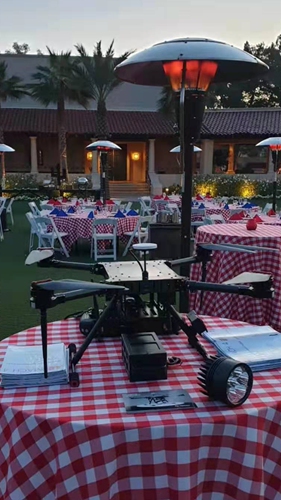Chinese drone producers are urging US politicians to evaluate their technology fairly without country-of-origin discrimination, and industry insiders said that the US won’t be able to find substitutes for made-in-China drones within two years.
Shenzhen-based dronemaker DJI urged US policymakers and industry stakeholders to “come together to create clear standards that will give commercial and government drone operators the assurance they need to confidently evaluate drone technology, no matter where it is made,” according to an announcement sent by the company to the Global Times on Monday.
The Financial Times newspaper has reported that the Trump administration plans to ground nearly 1,000 drones used by the US Department of the Interior (DOI) in the department’s concerns about importing Chinese technology.
“While we have not seen the new policy, we look forward to reviewing the findings of DOI’s ‘comprehensive review’ of its drone program given the lack of credible evidence to support a broad country-of-origin restriction on drone technology,” the announcement said.
The reported DOI plan drew strong objections as dozens of employees at several agencies protested against the plan to ground the drones permanently.
DJI, which is known for its Mavic and Phantom drones, has a market share of about 76.8 percent in the US, according to an analysis by Dronell.com.
A DJI spokesperson told the Global Times that the company’s data security work in 2019 made outstanding contributions to its products’ quality promotion:
“We have set up a special group on data security and hired a third-party data security firm to evaluate and assess our work. From supply chain security to data security, we have upgraded our quality control work,” the person said.
Another Shenzhen-based dronemaker, AEE Aviation Technology Co, which entered the US market seven years ago, told the Global Times that both its clients in the US and the company said the latest DOI plan is unrealistic, because the US has no supply chain to manufacture drones.
“Even if it could produce its own, the cost will double compared with buying made-in-China drones,” Zeng Desen, general manager of AEE’s overseas sales department, told the Global Times on Monday.
Drones are not like smartphones, which can be assembled in India or Vietnam, since they require a high level of integration capacity, Zeng said.
In addition, AEE said it has met the US’ stricter requirements since last year, such as achieving relevant authentication in terms of data chain regulation and image storage. In July last year, AEE was required to produce a letter of guarantee to the US government, vowing the content collected by its drones shall not be shared with any third party.
“Our data chain and cloud storage have both met US demands. Moreover, we cooperated with local technical partners to develop our business in the US,” Zeng said, urging the US not to use political means to crack down on Chinese technology companies.
“Its erratic requirements and uncertain policies caused us some annoyance, while ships bearing our drones are out at sea…In the longer term, the US crackdown on Chinese technology companies will make its customers and the US itself lose more,” Zeng noted.
Last year, AEE shipments to the US fell 20 percent due to the additional 25-35 percent tariffs imposed on the Chinese drones, but its revenue in Europe surged by more than 20 percent, with Japan and New Zealand also serving as growing markets.
Police in some parts of the US use AEE’s drones to conduct patrols, and its selfie drones are popular on Amazon.com and in US video stores.
Aerospace analysis company Teal Group said that China’s dronemakers dominate the global non-military market, and they will triple in size to $14.3 billion in sales in the next decade.
China’s dronemakers account for more than 70 percent of the global civilian drone market share. It will take at least two years for the US to develop its own civilian drones, said an industry insider who asked to remain anonymous.
Drone model AEE MACH4 is on show at the Police Technology eXchange PTX, held in December 2019 in Scottsdale, Arizona. The drone can perform night rescues, as well as detection and tracking. Photo:AEE


